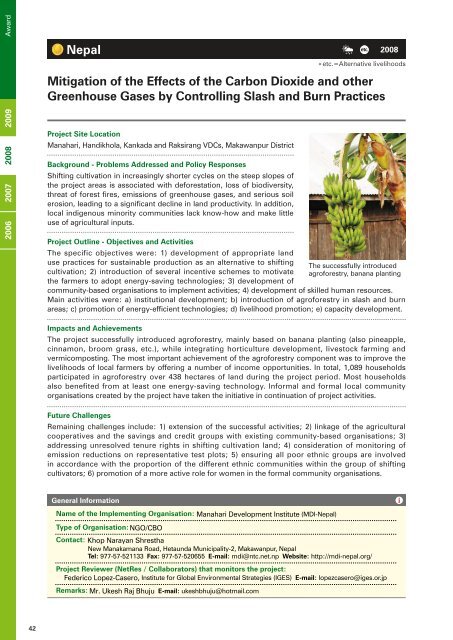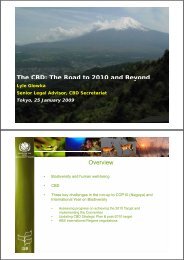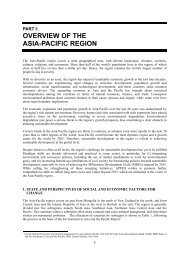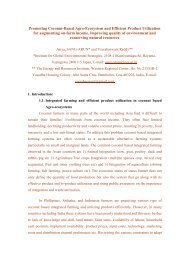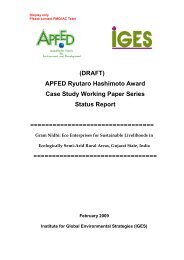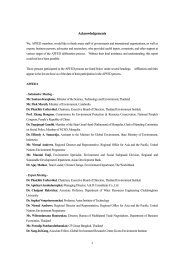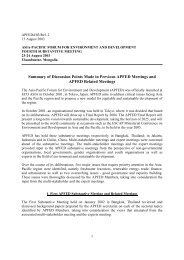APFED Booklet on Good Practices and Innovative Activities 2005 ...
APFED Booklet on Good Practices and Innovative Activities 2005 ...
APFED Booklet on Good Practices and Innovative Activities 2005 ...
Create successful ePaper yourself
Turn your PDF publications into a flip-book with our unique Google optimized e-Paper software.
Award<br />
Nepal<br />
etc.<br />
2008<br />
*etc.=Alternative livelihoods<br />
Mitigati<strong>on</strong> of the Effects of the Carb<strong>on</strong> Dioxide <strong>and</strong> other<br />
Greenhouse Gases by C<strong>on</strong>trolling Slash <strong>and</strong> Burn <strong>Practices</strong><br />
2009<br />
2006 2007 2008<br />
Project Site Locati<strong>on</strong><br />
Manahari, H<strong>and</strong>ikhola, Kankada <strong>and</strong> Raksirang VDCs, Makawanpur District<br />
Background - Problems Addressed <strong>and</strong> Policy Resp<strong>on</strong>ses<br />
Shifting cultivati<strong>on</strong> in increasingly shorter cycles <strong>on</strong> the steep slopes of<br />
the project areas is associated with deforestati<strong>on</strong>, loss of biodiversity,<br />
threat of forest fires, emissi<strong>on</strong>s of greenhouse gases, <strong>and</strong> serious soil<br />
erosi<strong>on</strong>, leading to a significant decline in l<strong>and</strong> productivity. In additi<strong>on</strong>,<br />
local indigenous minority communities lack know-how <strong>and</strong> make little<br />
use of agricultural inputs.<br />
Project Outline - Objectives <strong>and</strong> <strong>Activities</strong><br />
The specific objectives were: 1) development of appropriate l<strong>and</strong><br />
use practices for sustainable producti<strong>on</strong> as an alternative to shifting<br />
The successfully introduced<br />
cultivati<strong>on</strong>; 2) introducti<strong>on</strong> of several incentive schemes to motivate agroforestry, banana planting<br />
the farmers to adopt energy-saving technologies; 3) development of<br />
community-based organisati<strong>on</strong>s to implement activities; 4) development of skilled human resources.<br />
Main activities were: a) instituti<strong>on</strong>al development; b) introducti<strong>on</strong> of agroforestry in slash <strong>and</strong> burn<br />
areas; c) promoti<strong>on</strong> of energy-efficient technologies; d) livelihood promoti<strong>on</strong>; e) capacity development.<br />
Impacts <strong>and</strong> Achievements<br />
The project successfully introduced agroforestry, mainly based <strong>on</strong> banana planting (also pineapple,<br />
cinnam<strong>on</strong>, broom grass, etc.), while integrating horticulture development, livestock farming <strong>and</strong><br />
vermicomposting. The most important achievement of the agroforestry comp<strong>on</strong>ent was to improve the<br />
livelihoods of local farmers by offering a number of income opportunities. In total, 1,089 households<br />
participated in agroforestry over 438 hectares of l<strong>and</strong> during the project period. Most households<br />
also benefited from at least <strong>on</strong>e energy-saving technology. Informal <strong>and</strong> formal local community<br />
organisati<strong>on</strong>s created by the project have taken the initiative in c<strong>on</strong>tinuati<strong>on</strong> of project activities.<br />
Future Challenges<br />
Remaining challenges include: 1) extensi<strong>on</strong> of the successful activities; 2) linkage of the agricultural<br />
cooperatives <strong>and</strong> the savings <strong>and</strong> credit groups with existing community-based organisati<strong>on</strong>s; 3)<br />
addressing unresolved tenure rights in shifting cultivati<strong>on</strong> l<strong>and</strong>; 4) c<strong>on</strong>siderati<strong>on</strong> of m<strong>on</strong>itoring of<br />
emissi<strong>on</strong> reducti<strong>on</strong>s <strong>on</strong> representative test plots; 5) ensuring all poor ethnic groups are involved<br />
in accordance with the proporti<strong>on</strong> of the different ethnic communities within the group of shifting<br />
cultivators; 6) promoti<strong>on</strong> of a more active role for women in the formal community organisati<strong>on</strong>s.<br />
General Informati<strong>on</strong><br />
Name of the Implementing Organisati<strong>on</strong>: Manahari Development Institute (MDI-Nepal)<br />
Type of Organisati<strong>on</strong>: NGO/CBO<br />
C<strong>on</strong>tact: Khop Narayan Shrestha<br />
New Manakamana Road, Hetaunda Municipality-2, Makawanpur, Nepal<br />
Tel: 977-57-521133 Fax: 977-57-520655 E-mail: mdi@ntc.net.np Website: http://mdi-nepal.org/<br />
Project Reviewer (NetRes / Collaborators) that m<strong>on</strong>itors the project:<br />
Federico Lopez-Casero, Institute for Global Envir<strong>on</strong>mental Strategies (IGES) E-mail: lopezcasero@iges.or.jp<br />
Remarks: Mr. Ukesh Raj Bhuju E-mail: ukeshbhuju@hotmail.com<br />
42


